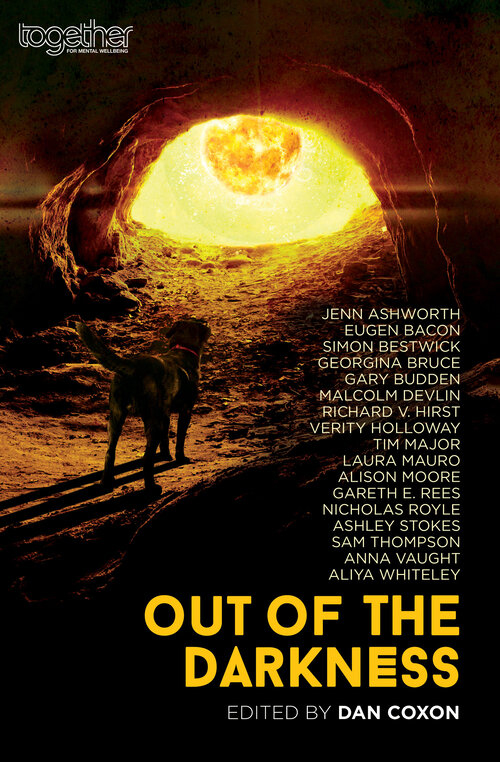
Out of the Darkness
Editor: Dan Coxon
Published: 16 September 2021
Publisher: Unsung Stories
Reviewer: Tim Conder
The Wikipedia article for “Horror (Genre)” claims it is a genre of speculative fiction that is designed to frighten, scare, or disgust. It goes on to discuss its prominent antagonists as ghosts, ghouls, and the like that are (it claims) meant to stand in for the things that our society is truly afraid to confront.
Dan Coxon’s collection of horror/dark fantasy stories, Out of the Darkness, subverts this definition by confronting us instead with fear itself as the deepest antagonist of the human condition. This anthology—a fundraiser for the UK-based charity Together for Mental Wellbeing—contains seventeen short stories, in which experienced authors provide different perspectives of mental illness. The stories share a common theme: the uncertainty that comes with having your own mind working against you.
Most of the stories—consistent with the challenge of helping the audience experience the internal reality of mental illness—are told from the perspective of an afflicted character. Jenn Ashworth’s “The Note” is a compelling portrait of intrusive thoughts, and the fears that accompany them. The reader, over a story that lasts a single night, shares the narrator’s thoughts as she begins to question reality, waiting for the long night to end and the morning to reveal the truth. Other stories in the anthology share the same urgency—the compression of time serving to heighten the feeling of being trapped by an uncertain perception.
Tim Major’s “Goodbye, Jonathan Tumbledown” explores the thread between memory and relationships, in which one cannot survive without the other, by delving into the relationship between a son and his father, the latter unable to remember their shared life. Aliya Whiteley’s “The Chorus” likewise forces readers to imagine a world where normal perceptions are the exception, not the rule. Both of these stories implore readers to engage with the understanding of reality in a new and refreshing way.
The characters at the heart of the narratives are deeply empathetic, because of how relatable these interruptions from daily life are when taking into account each character’s mental illness. In particular, Simon Bestwick’s “The Hungry Dark” presents a sensitive and balanced view on medicating mental illness. The protagonist suffers side effects from a new treatment and uses this drug-induced perspective to bridge the gap between being ill and being healthy, drawing into question the definition of “healthy” in this context.
The characters and their personal experiences with mental illness drive the different narratives forward. But it is the baggage of these characters’ fears that seeps into the reader’s heart and mind as easily as any horror-antagonist. If the ghosts and ghouls of traditional horror stories are meant to stand in for our deepest fears, then Out of the Darkness forces readers to confront a very real fear head on: that our own thoughts may betray us. It’s a horror that is a reality for so many. But, this collection creates a podium for the characters so we as readers may overcome our own (what sometimes may be) limited understanding of mental illness and empathise with the characters, and with the people all around us.
This book, as it notes in its introduction, is incredibly timely. Even before the COVID-19 pandemic, mental illness was topical. Our very-online world may be excellent at connecting us superficially, but it often fails to create a deep and supportive community. This reality has been exacerbated by the experience of the last two years, making the cause that this book supports particularly important.
The authors who contributed to the anthology have all agreed to give their royalties from the book to Together for Mental Wellbeing, so every copy of the book sold represents a donation to help people reclaim their mental independence. But more than this, the book is an opportunity for thought and conversation about an increasingly important topic: mental illness. Its sensitivity and depth of compassion for its subject make it a worthy contribution to the cause.
